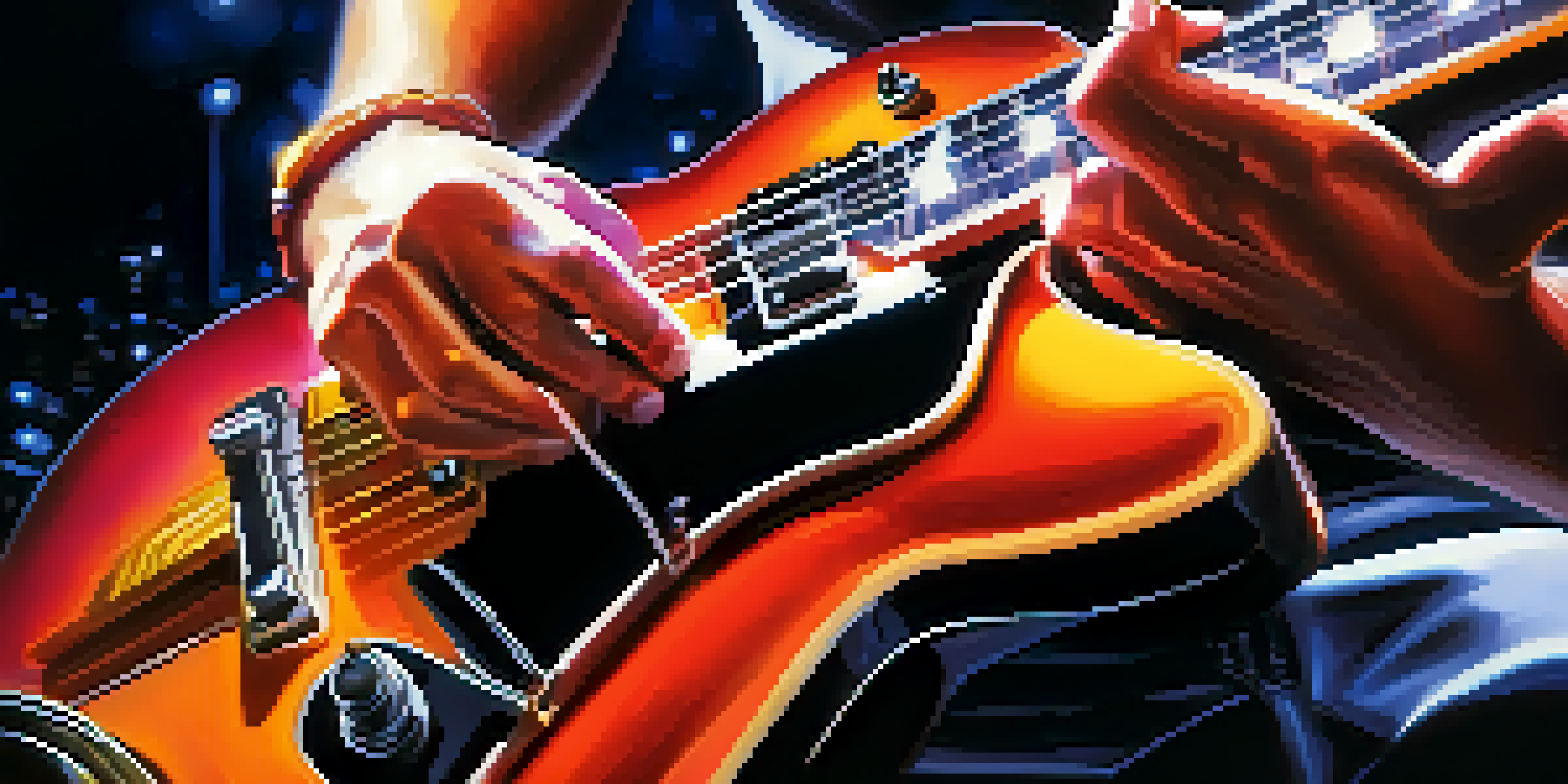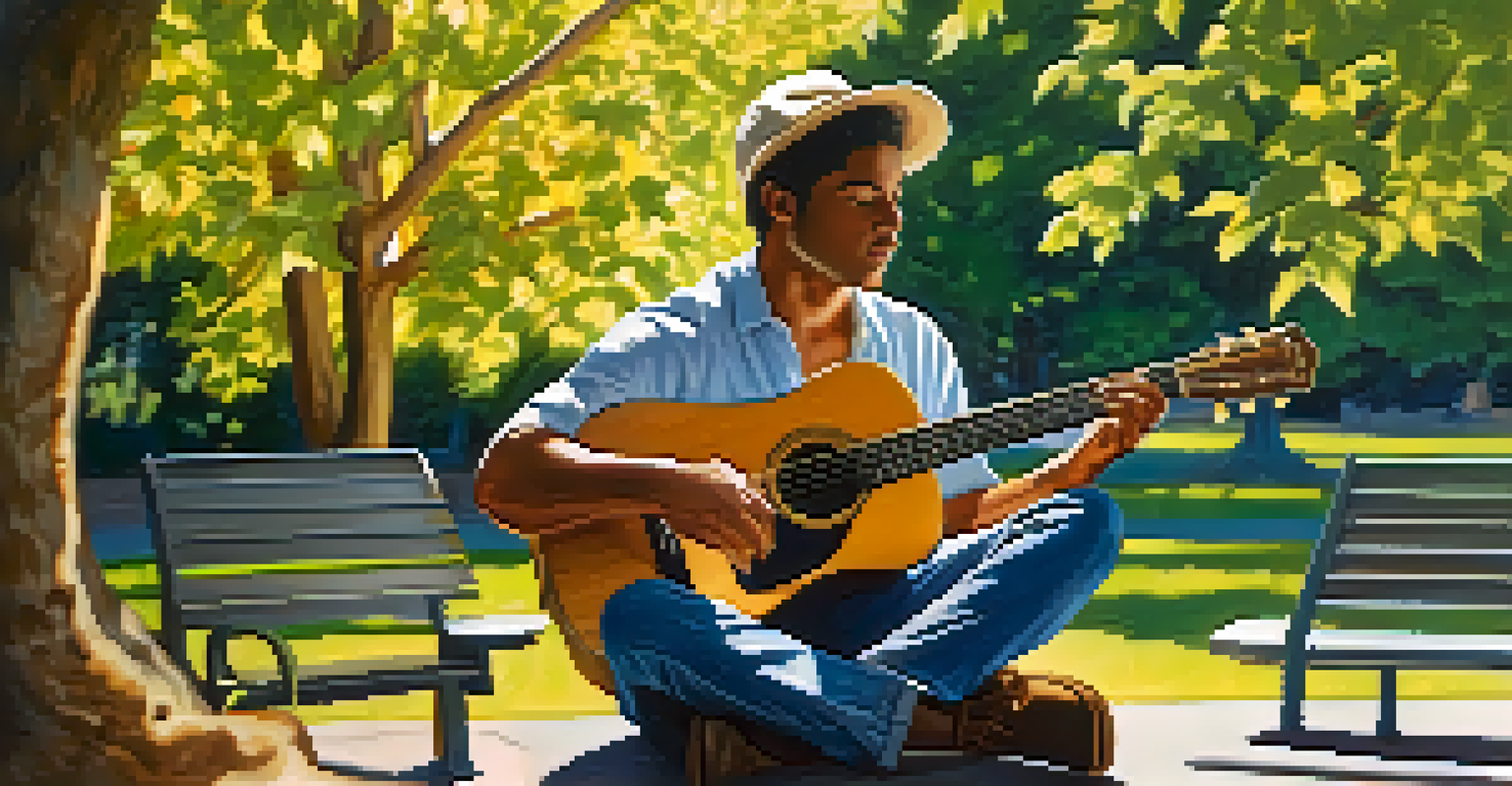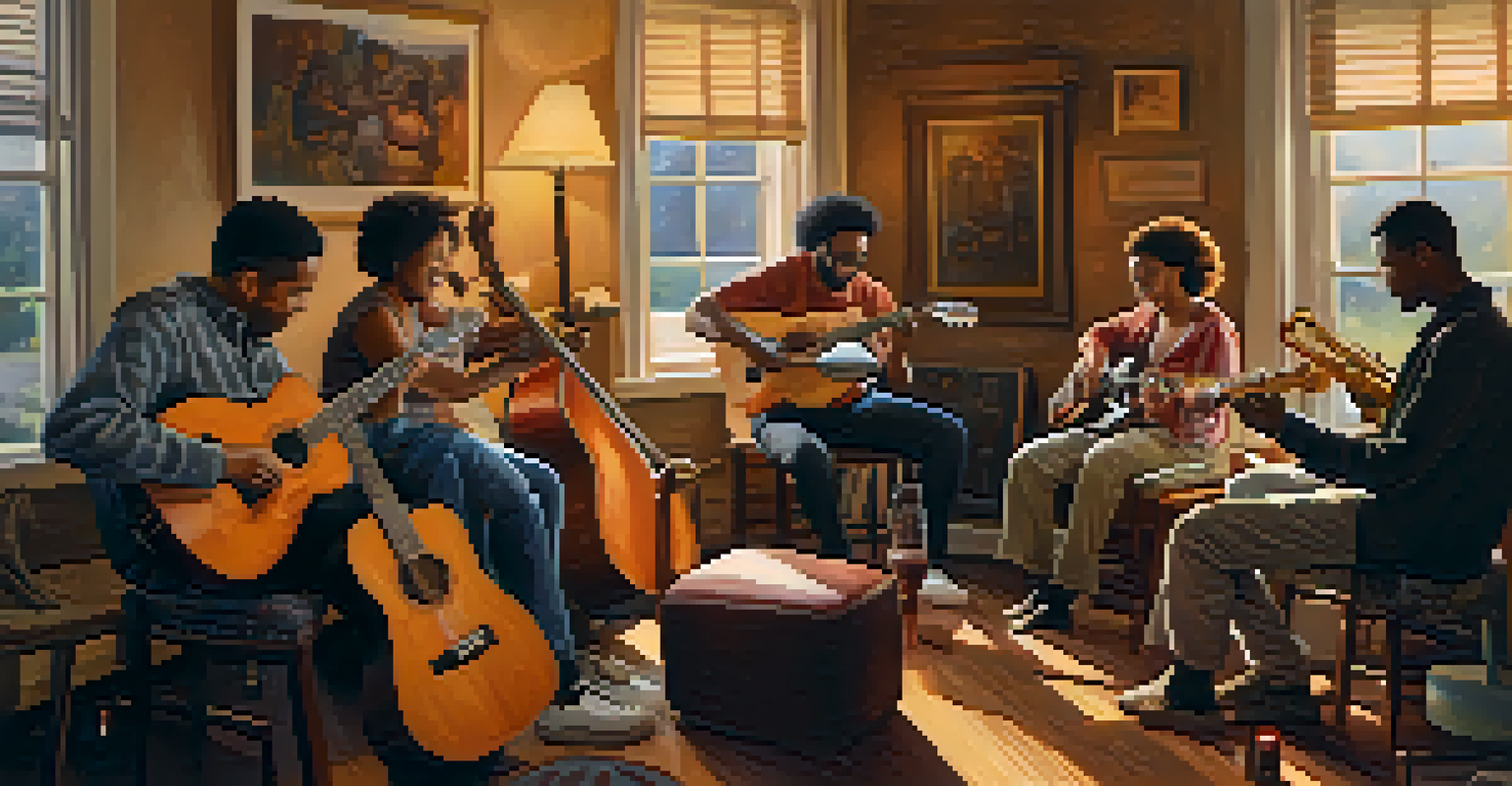Exploring the Basics of Guitar Improvisation for Beginners

Understanding the Concept of Improvisation in Music
Improvisation in music is like having a conversation without a script. It's the art of creating melodies on the spot, allowing you to express your emotions and thoughts through your guitar. For beginners, this can seem daunting, but it’s all about experimenting and finding your unique voice.
Improvisation is the ultimate expression of a musician's individuality.
Think of it as a journey rather than a destination. When you improvise, you’re not just playing notes; you’re communicating. The more you practice, the more fluent you’ll become, turning those moments of uncertainty into spontaneous bursts of creativity.
Remember, every musician has their own style of improvisation. Just as no two conversations are alike, your improvisation will reflect your personality and experiences. Embrace this individuality, and let it guide your musical journey.
Essential Techniques for Guitar Improvisation
There are several fundamental techniques that can enhance your improvisational skills. First, familiarize yourself with scales, as they provide the backbone for most melodies. The pentatonic scale is particularly beginner-friendly and can serve as a solid foundation for improvisation.

Another technique to explore is the use of arpeggios, which are simply the notes of a chord played in sequence. This adds a melodic richness to your improvisation and allows you to create more intricate lines. By practicing these techniques, you'll start to feel more comfortable navigating the fretboard.
Embrace Your Unique Musical Voice
Improvisation is an opportunity to express your individuality and emotions through your guitar playing.
Lastly, don’t forget about dynamics and phrasing. These elements can elevate your improvisation from basic to captivating. Experiment with playing softly and then suddenly louder, or try holding certain notes longer to create tension and release.
The Role of Listening in Improvisation
Listening is a crucial skill in guitar improvisation. The more you listen to different musical styles and artists, the more ideas you’ll gather. This allows you to absorb various techniques and approaches that you can incorporate into your own playing.
Music is the shorthand of emotion.
Try to analyze what you hear. Ask yourself questions like, 'What scales are they using?' or 'How do they build their solos?' This active listening helps you understand the structure of improvisation and inspires your creativity.
Additionally, playing along with recordings can be incredibly beneficial. Find a backing track or jam with friends, and let your guitar respond to the music around you. This interaction reinforces your ability to improvise in real-time, making the process more enjoyable.
Practicing Improvisation: Tips for Beginners
When it comes to practicing improvisation, consistency is key. Set aside time each day to experiment with different scales and techniques. Even just 10-15 minutes can make a significant impact on your skills over time.
Start by playing over simple chord progressions. As you become more comfortable, challenge yourself with more complex changes. This will help you learn how to adapt your improvisation to different musical contexts.
Practice Makes Improvisation Easier
Consistent practice with scales, techniques, and jamming helps build confidence and enhances your improvisational skills.
Don’t be afraid to make mistakes! Every great musician has gone through a phase of trial and error. Treat each mistake as a learning opportunity, and soon you’ll find your improvisational confidence growing.
Finding Your Unique Voice as a Guitarist
Every guitarist has a unique voice, and improvisation is a wonderful way to discover yours. It’s about finding what resonates with you and expressing it through your playing. Start by exploring different genres and styles to see what inspires you the most.
As you experiment, pay attention to the emotions that certain notes or phrases evoke. This emotional connection can guide your improvisation, making it feel more genuine and personal. Over time, you’ll develop a style that feels authentic to you.
Remember, your voice will evolve as you grow. Embrace this evolution, and don’t hesitate to try new things. The more you explore, the more you’ll uncover your unique sound.
The Importance of Jamming with Other Musicians
Jamming with other musicians can be a game-changer for your improvisation skills. It exposes you to different playing styles and ideas, pushing you out of your comfort zone. Engaging with others can also spark inspiration, leading to new musical directions.
Don’t worry if you’re a beginner; everyone has to start somewhere. Find local jam sessions or online communities where you can connect with other musicians. These experiences will not only improve your skills but also help you build confidence.
Listening Fuels Creative Ideas
Active listening to various musical styles and artists inspires creativity and improves your improvisation abilities.
Moreover, jamming is about collaboration and sharing ideas. Listen to your fellow musicians, learn from them, and contribute your own creativity. This back-and-forth exchange can significantly enhance your improvisational abilities.
Using Technology to Enhance Your Improvisation Skills
In today’s digital age, technology offers numerous tools to help you improve your guitar improvisation. Apps and software can provide backing tracks, metronomes, and even scale suggestions to practice along with. These resources can make practicing more engaging and productive.
YouTube is another fantastic platform for finding tutorials and videos of your favorite guitarists. Watching them improvise can give you ideas and techniques to try out. The visual aspect can also help you understand finger placements and movements on the fretboard.

Lastly, consider recording your improvisation sessions. Listening back can provide valuable insights into your playing, allowing you to identify areas for improvement. Plus, it’s always exciting to hear your progress over time!
Embracing the Journey of Improvisation
Improvisation is a journey filled with discovery and growth. It’s not just about playing the right notes; it’s about expressing yourself and having fun. As you embark on this journey, remember that every experience—good or bad—contributes to your development as a guitarist.
Be patient with yourself. Mastery takes time, and it’s important to enjoy the process rather than rush to the end goal. Celebrate your small victories along the way, whether it’s nailing a new scale or successfully improvising a solo.
Improvisation as Personal Expression
Improvisation allows musicians to express their emotions and individuality, making each performance unique.
Ultimately, improvisation is about connecting with music and expressing your individuality. Keep an open mind, stay curious, and let your passion for guitar guide you on this exciting adventure.